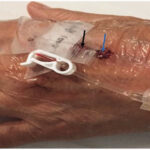A duodenal ulcer is a sore that forms in the first part of the small intestine, known as the duodenum. It occurs due to an imbalance between stomach acid production and the protective mechanisms of the gastrointestinal lining. If left untreated, duodenal ulcers can lead to complications such as bleeding, perforation, and obstruction.

Importance of Maintenance Therapy
After initial treatment, maintaining the healing of a duodenal ulcer is crucial to prevent recurrence. Maintenance therapy involves lifestyle modifications, continued medication, and regular monitoring to ensure the ulcer does not return.
Common Causes of Duodenal Ulcers
- Helicobacter pylori (H. pylori) Infection – The primary cause of most duodenal ulcers.
- Non-Steroidal Anti-Inflammatory Drugs (NSAIDs) – Chronic use can damage the stomach lining.
- Excess Stomach Acid – Overproduction of acid due to stress, smoking, or genetic factors.
- Dietary Habits – Spicy, acidic, and alcohol-containing foods may exacerbate symptoms.
- Smoking and Alcohol Consumption – These weaken the mucosal lining and increase acid production.
Strategies for Maintaining Healing of Duodenal Ulcers
1. Medication Therapy
Proton Pump Inhibitors (PPIs)
PPIs such as omeprazole, lansoprazole, and esomeprazole are the most effective in reducing stomach acid production, allowing the ulcer to heal completely.
H2 Receptor Antagonists
Ranitidine and famotidine help in lowering acid levels, though they are less potent than PPIs.
Antibiotic Therapy for H. pylori
For patients with H. pylori infection, a combination of antibiotics such as clarithromycin, amoxicillin, and metronidazole is prescribed alongside PPIs.
Cytoprotective Agents
Medications like sucralfate and misoprostol help in forming a protective barrier over the ulcer, reducing further damage.
2. Dietary and Lifestyle Modifications
- Balanced Diet: Include fiber-rich foods like vegetables, fruits, and whole grains to support digestion.
- Avoid Irritants: Cut down on caffeine, alcohol, and spicy foods that may trigger acid production.
- Frequent Small Meals: Eating smaller meals reduces the risk of acid overproduction.
- Stay Hydrated: Water aids digestion and helps maintain mucosal integrity.
- Quit Smoking and Alcohol: These habits slow down ulcer healing and increase recurrence risk.
3. Stress Management
Stress is linked to increased acid production and can worsen ulcer symptoms. Effective stress management techniques include:
- Meditation and Deep Breathing Exercises
- Regular Physical Activity
- Adequate Sleep and Rest
4. Regular Monitoring and Follow-ups
Patients should undergo periodic endoscopic examinations to assess ulcer healing. Routine stool tests and breath tests can check for persistent H. pylori infection.
Complications of Neglected Maintenance
Failure to adhere to maintenance therapy can lead to:
- Recurrent Ulcers
- Gastrointestinal Bleeding
- Perforation of the Duodenum
- Pyloric Stenosis (Narrowing of the Duodenum)
The maintenance of a healing duodenal ulcer requires a multifaceted approach, including proper medication, lifestyle modifications, and regular medical check-ups. Adhering to these strategies helps in reducing ulcer recurrence and improving overall digestive health.

